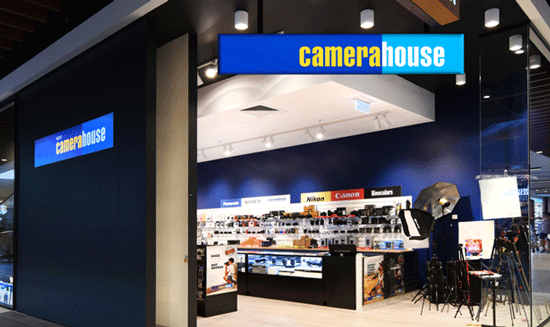‘No one is smashing it out of the ballpark at the moment,’ new Camera House general manager Paul Rogers observed this week about Camera House stores and photo specialty retailing in general.
 Paul (pictured right) has just completed his first month in his new role as general manager, Camera House. Most PhotoCounter readers would probably agree that photo retailing is not exactly going gangbusters, but it’s nonetheless refreshing to have a realistic rather than ‘rose-coloured glasses’ take on the state of play by a senior executive.
Paul (pictured right) has just completed his first month in his new role as general manager, Camera House. Most PhotoCounter readers would probably agree that photo retailing is not exactly going gangbusters, but it’s nonetheless refreshing to have a realistic rather than ‘rose-coloured glasses’ take on the state of play by a senior executive.
As tough as the market might be, Camera House achieved its earnings and profit forecasts for 2017 (‘A pass mark for that’) and Paul reports 1st quarter sales are ‘line ball with last year, which also correlates to our forecasts.’
He pointed out that the Camera House group is not all about the financial results of parent Raleru, but rather ‘ensuring the profitability of our members’ – increasing the profitability of the Raleru warehouse can’t come at the expense of Camera House members.
Last year saw the opening of a new Camera House store in East Maitland (Green Hills Shopping Centre) following the collapse of the Paxtons group in 2016.

‘The opening of the East Maitland store was encouraging,’ he said.
‘We are doing OK despite the loss of Paxtons, although we would prefer they were still around and strong,’ said Paul.
He said Camera House ‘was always looking for new recruits’.
‘We would like to see new stores but are we going to open 10 or 20 stores in the next 12 months? I doubt it, but we are happy to speak to anyone. I’d like to think there would be expansion but for many retailers its pretty tough out there.’
Because Cameras House is not anticipating a surge in growth any time soon, the strategic focus is on increasing market share instead.
‘I don’t think the category will grow. Maybe it will actually decline in some areas,’ he said. ‘Our strategy is to try to increase our market share, and increase average selling prices we are achieving across the whole basket of goods, services, accessories, training…
‘We need to leverage our position as a full-service retailer beyond camera bodies.
‘Business 101 is that you have to create your own unique positioning. You have to do your best to protect your corner of the market.’
He nominated film sales and associated processing printing and scanning services as a bright spot for specialty retailers.
‘If a store can make an extra $10K out of the category then most would be happy to leverage that. It’s another dynamic back into the industry. It creates a buzz and creates store traffic.’
The entry of Amazon has ‘upped the ante’ somewhat, and Paul said that was an inevitability as the online behemoth goes global.
‘They are a sophisticated online retailer – they will keep everyone honest,’ he said. Unlike Ted’s and some other prominent local camera specialists, Camera House has not yet booked a stall in the Amazon Australia Marketplace.
‘It’s certainly something we need to monitor to see if its a valid place for us,’ said Paul.
He is optimistic that the introduction of GST on all products under $1000 sold by offshore vendors will have a positive impact o the local market.
‘Hopefully (the legislation) is implemented this time. I’m not sure what the impact would be to be honest, but it’s a step in the right direction. Hopefully everyone abides by it and the government can collect the tax.
‘If Ebay and Amazon play ball it sorts out a large proportion of the challenge, so hopefully the government has some tricks up their sleeve to create a level playing field for Australian retailers.’
Referring back to our recent story on three Hobart stores closing in quick succession, Paul was asked whether the wide spread of wholesale prices depending on a retailer’s buying power was a systemic problem for smaller Australia retailers, who end up playing the role of unfunded showrooms for the camera vendors.
‘Wholesalers in any industry will have different pricing structures,’ he said. ‘Our members definitely benefit from being part of the group. We have some small retailers, some larger retailers and some mini groups.
‘Our job is to make sure we are treating all members equally and buying on behalf of the whole group.
‘But I agree with you that there are people treating retail stores as showrooms. That’s going to continue. He said the challenge was to divert the focus of such customers away from price to the other qualities a full service photo specialist delivers such as expertise, range, post-sales support and training.
He wouldn’t be drawn on which wholesalers were working best with Camera House, but did note that there was some growth in the mirrorless compact system camera category driven by Sony Fujifilm Olympus and Panasonic.
‘We have 10 major suppliers and they are all super valuable. All suppliers have become more sophisticated, with bundles, kits, value add deals and the use of social media, he said.
He said beyond pricing advantages, the major vendors know and trust Camera House, value its opinion and help devise tailored marketing programs with the group.
On the thorny issue of Canon’s sometimes aggressive promotion of its own retail business, the online Canon Store, it was a matter of not sweating on things you can’t control: ‘Canon – sometimes they are a competitor. That’s their strategy to manage. We have no control over that so I tend not to focus so much on it.
‘I think when any new competitor comes into the market that’s more challenging for us.’
(He did however express a preference for the less aggressive online retailing endeavours of other suppliers!)





Be First to Comment